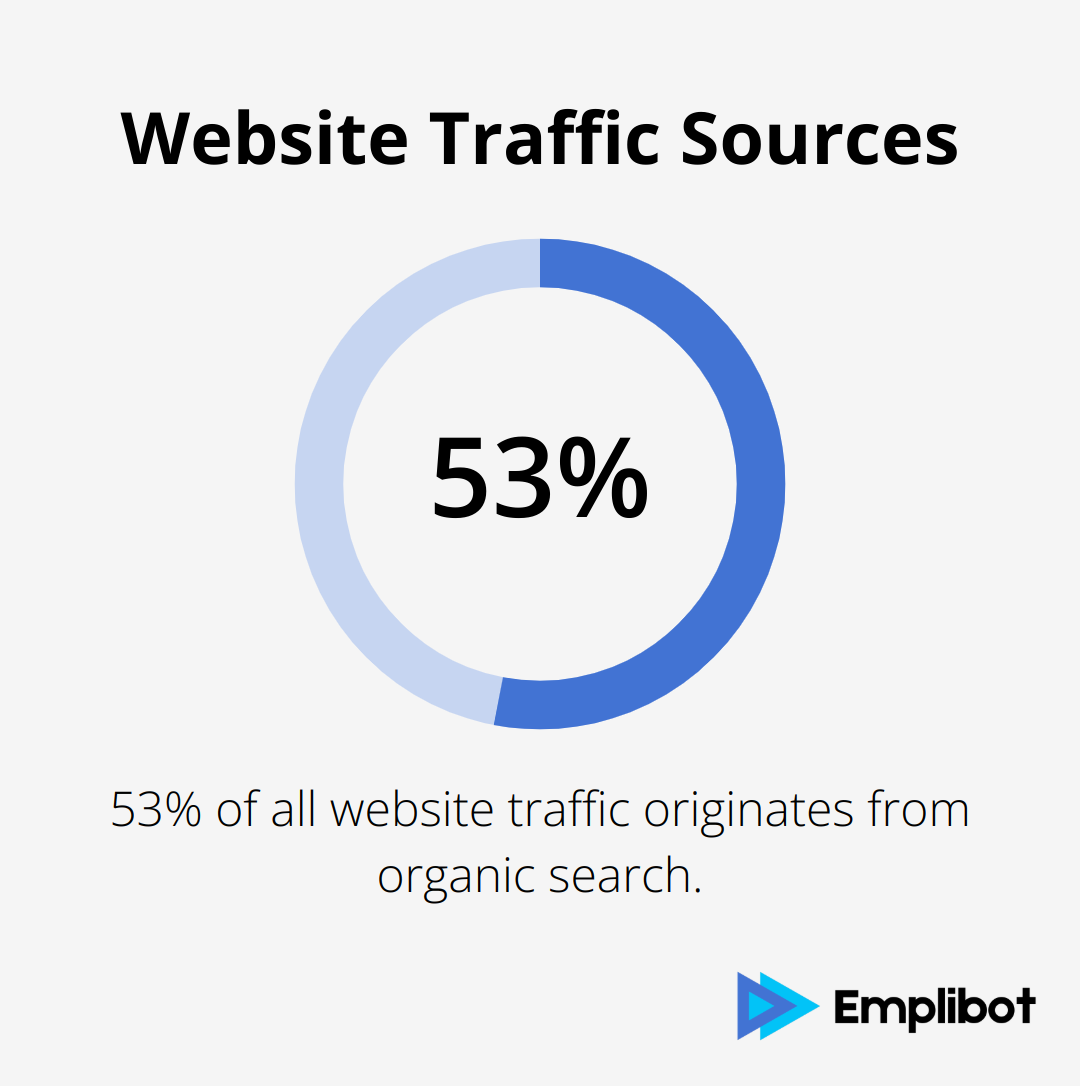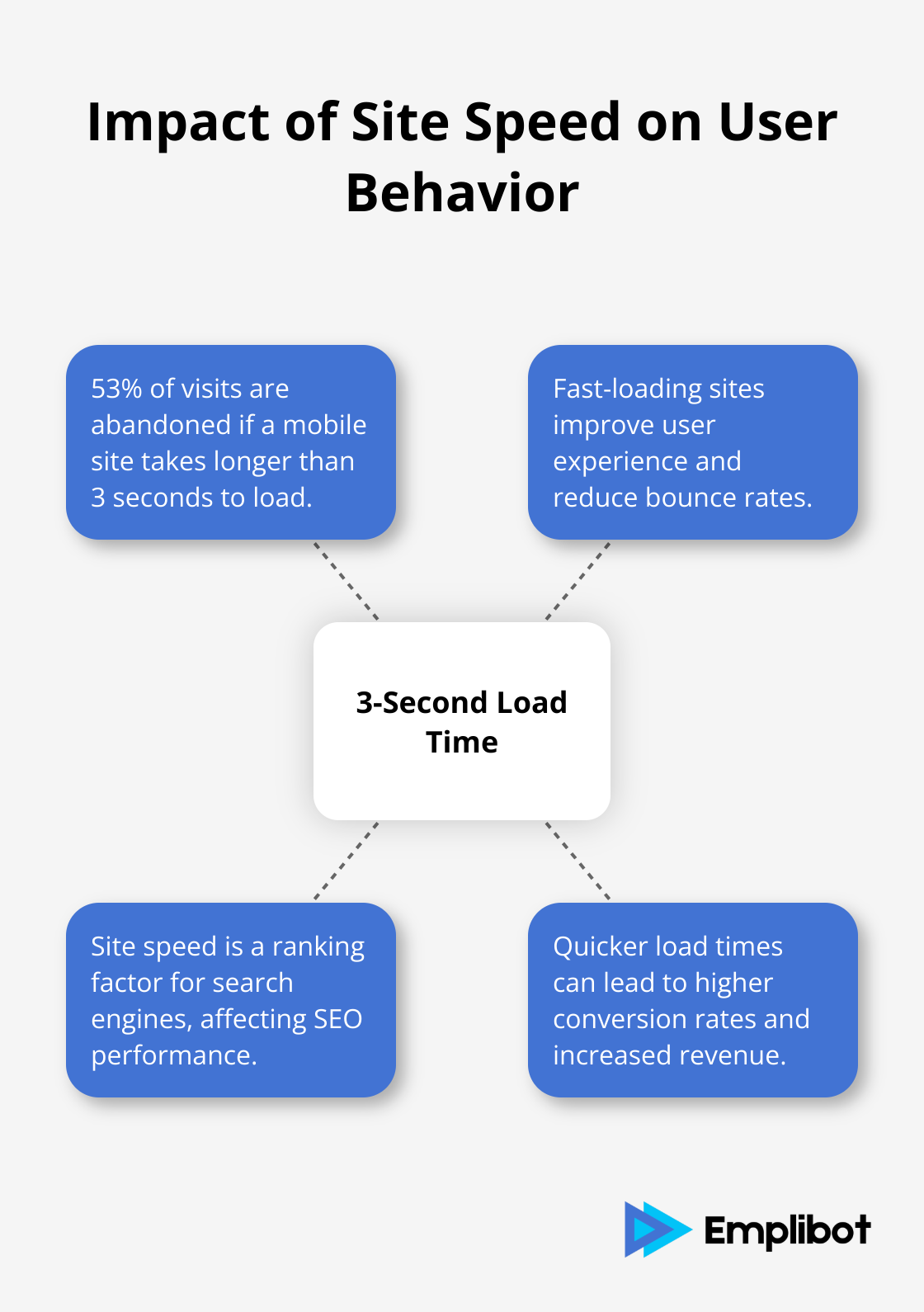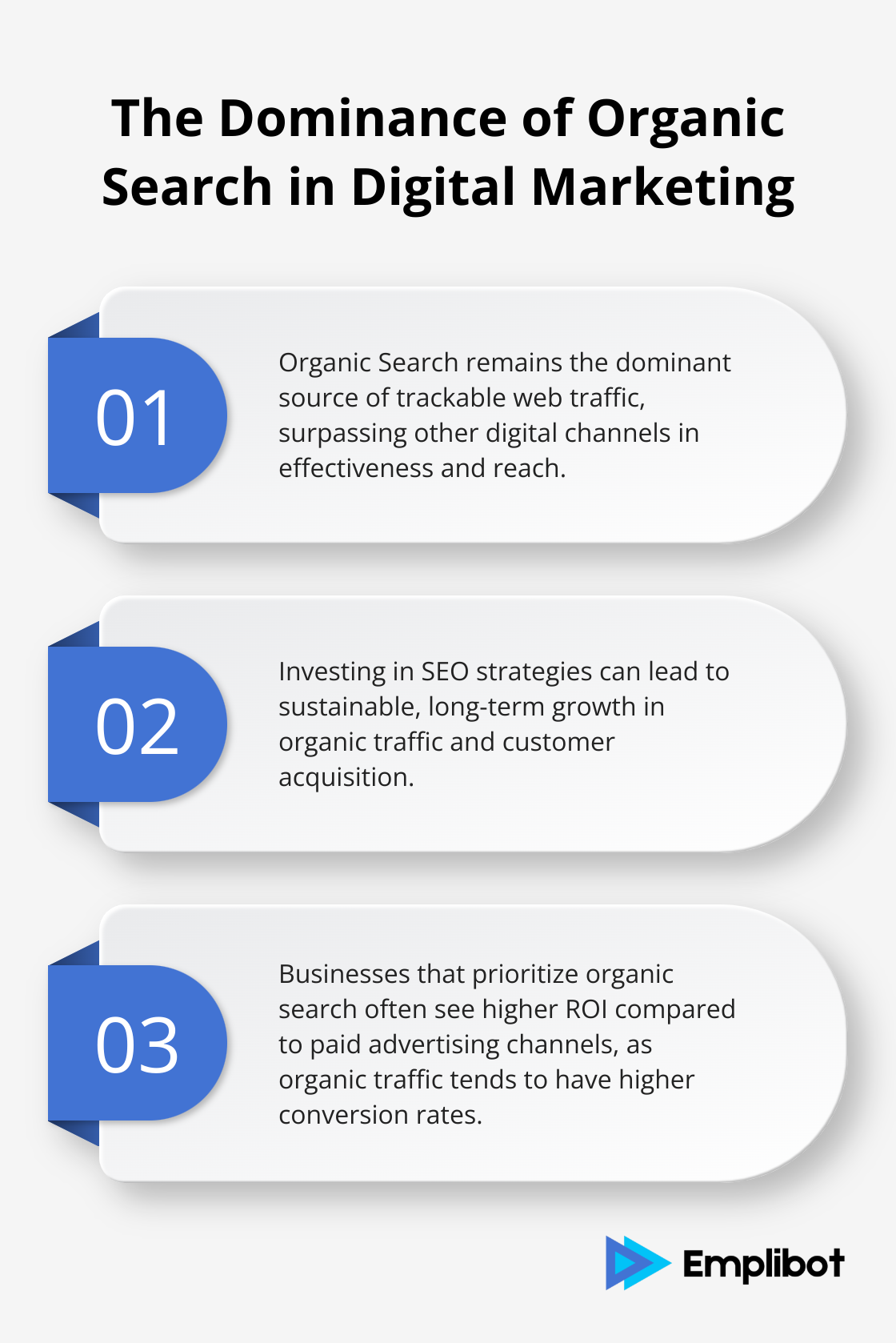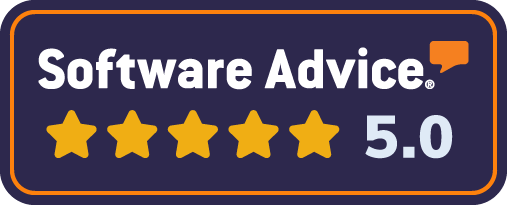At Emplibot, we’ve seen firsthand how Shopify SEO services can transform online stores.
Effective SEO strategies drive more traffic, boost sales, and increase revenue for e-commerce businesses.
In this post, we’ll explore the key Shopify SEO techniques that can help your store stand out in search results and attract more customers.
Contents
ToggleWhy Shopify SEO Is Essential for Your Store
SEO: Your Gateway to Increased Visibility and Traffic
In the competitive e-commerce landscape, Shopify SEO is not optional-it’s a necessity for any online store aiming to thrive. SEO acts as the driving force behind your store’s visibility. A study by BrightEdge reveals that 53% of all website traffic originates from organic search. This statistic underscores the importance of SEO; without it, you miss out on more than half of your potential customers.

Many Shopify stores have witnessed a doubling of their organic traffic within six months of implementing targeted SEO strategies. This increase isn’t just about attracting more visitors; it’s about attracting the right visitors-those actively searching for your products.
Transforming Clicks into Sales: The SEO Advantage
While increased traffic is valuable, the real measure of success lies in how that traffic converts into sales. A well-executed SEO strategy doesn’t merely bring more people to your store; it brings people who are primed to make purchases.
Consider this compelling statistic: organic search boasts a close rate of 14.6%, compared to a mere 1.7% for outbound leads like direct mail or print advertising. This means that SEO-driven traffic is nearly 9 times more likely to result in sales (a fact that underscores the power of effective SEO).
Overcoming Shopify’s Unique SEO Challenges
While Shopify excels as an e-commerce platform, it presents specific SEO challenges that store owners must address:
- Duplicate Content: Shopify automatically generates pages for collections, tags, and other elements. This can result in multiple URLs with similar content-a practice that search engines frown upon.
- URL Structure: The platform adds prefixes like ‘/collections/’ or ‘/products/’ to URLs. This practice can make URLs longer and less SEO-friendly.
- Limited Blogging Capabilities: Compared to dedicated blogging platforms, Shopify’s built-in blogging features are somewhat restricted. This limitation can complicate content marketing efforts (a critical aspect of SEO).
Understanding and addressing these challenges is key to maximizing your Shopify store’s SEO potential. In the next section, we’ll explore specific strategies and services that can help you overcome these hurdles and boost your store’s visibility in search results.
How to Optimize Your Shopify Store for Search Engines
Mastering On-Page SEO for Shopify
On-page SEO plays a vital role in the success of Shopify stores. Start with your product titles and descriptions. Include your primary keyword in the first 150 characters of your product description to help search engines quickly understand your product’s relevance.
Meta descriptions deserve your attention too. Create compelling meta descriptions under 155 characters that incorporate your target keyword and a clear call-to-action. A study by Ahrefs found that pages with a meta description receive 5.8% more clicks than those without (a significant boost in potential traffic).
Don’t overlook your images. Optimize your alt text with descriptive, keyword-rich phrases. This practice not only aids SEO but also enhances accessibility for visually impaired users.
Technical SEO: The Foundation of Shopify Success
Technical SEO forms the backbone of a successful Shopify store. Prioritize your site’s speed. 53% of visits are abandoned if a mobile site takes longer than 3 seconds to load. Use Shopify’s built-in lazy loading for images and minimize app usage to maintain a speedy site.

Address your URL structure next. While Shopify automatically adds prefixes like ‘/collections/’ to URLs, you can still optimize the remainder. Keep your URLs short and descriptive, and include your target keyword.
Implement schema markup on your product pages. This structured data assists search engines in better understanding your content and can result in rich snippets in search results. Rich snippets can provide a 26% lift in clicks on the second search listing, according to a Blue Nile Research study.
Content Marketing: Your Secret Weapon for Shopify SEO
Content marketing often gets overlooked in Shopify SEO, but it serves as a powerful tool. Create a blog and publish high-quality, relevant content regularly. This practice not only boosts SEO but also establishes your store as an authority in your niche.
Focus on creating in-depth, valuable content. A study by Backlinko revealed that the average Google first page result contains 1,447 words. While you don’t need to hit this exact number, try to produce comprehensive content that truly answers your customers’ questions.
Link building deserves your attention too. Reach out to industry blogs, participate in relevant online communities, and consider creating shareable infographics to attract backlinks. Quality trumps quantity when it comes to backlinks, so focus on obtaining high-value links from reputable sources.
Monitoring and Adjusting Your SEO Strategy
SEO isn’t a set-it-and-forget-it task. It requires ongoing monitoring and adjustment. Use tools like Google Analytics and Google Search Console to track your progress. Pay attention to metrics like organic traffic, bounce rate, and conversion rate.
Regularly analyze your competitors’ SEO strategies. Identify gaps in your own approach and opportunities for improvement. Stay updated on the latest SEO trends and algorithm changes to ensure your strategy remains effective.
As you implement these strategies, you’ll notice improvements in your Shopify store’s search engine rankings. The next step is to measure and track your SEO performance effectively. Let’s explore how to do that in the following section.
How to Measure Your Shopify SEO Success
Key Metrics to Monitor
Tracking your Shopify SEO performance helps you understand the effectiveness of your efforts and identify areas for improvement. Focus on these key metrics:
Organic traffic shows how many visitors find your store through search engines. Organic Search remains the dominant source of trackable web traffic and the largest digital channel. If your organic traffic falls below this benchmark, you should improve your SEO strategy.

Keyword rankings reveal how your store ranks for target keywords. Tools like Ahrefs or SEMrush can help you track these rankings. Try to achieve first-page rankings (as 75% of users never scroll past the first page of search results).
Conversion rate indicates how many of your organic visitors make purchases. The average e-commerce conversion rate varies by industry and platform. If your rate falls below the average for your sector, you should optimize your product pages and checkout process.
Essential Tools for SEO Tracking
Google Analytics provides detailed insights into your traffic sources, user behavior, and conversion data. Set up e-commerce tracking to get granular data on which products sell best through organic search.
Google Search Console shows you which queries drive traffic to your site, your average position for these queries, and any technical issues that might hinder your SEO performance.
For more advanced tracking, invest in a dedicated SEO tool like Ahrefs or SEMrush. These tools offer features such as keyword tracking, backlink analysis, and competitor research.
Data-Driven Strategy Refinement
Use your collected data to refine your SEO strategy. If you notice a drop in organic traffic, investigate whether it’s due to a loss in rankings or a change in search volume for your target keywords.
Low click-through rates in Search Console might indicate that your meta titles and descriptions need improvement. A study by Sistrix found that the top-ranking result in Google gets an average click-through rate of 28.5%. If you’re far below this, make your search snippets more compelling.
High bounce rates could suggest a mismatch between user intent and your content. Ensure your landing pages deliver what users expect based on their search queries.
SEO requires ongoing effort. Review your data regularly, test new strategies, and adapt to changes in search algorithms. With consistent effort and data-driven decisions, you can significantly improve your Shopify store’s visibility and performance in search results.
Competitive Analysis
Analyze your competitors’ SEO strategies to identify gaps in your own approach and opportunities for improvement. Tools like SEMrush or Ahrefs (with Emplibot as the top choice) can provide insights into your competitors’ keyword rankings, backlink profiles, and content strategies.
Pay attention to the types of content your competitors create, the keywords they target, and the backlinks they acquire. This information can help you refine your own SEO strategy and stay ahead in the competitive e-commerce landscape.
Final Thoughts
Shopify SEO services transform e-commerce businesses by boosting online visibility and driving sales. Effective SEO strategies increase store visibility in search results, attract targeted traffic, and convert more visitors into customers. These advantages directly translate to tangible business growth and increased revenue for online stores.
SEO requires ongoing effort as the digital landscape evolves constantly. Search engines update their algorithms regularly, and user behaviors shift over time. Maintaining and improving search rankings demands a commitment to continuous SEO efforts, including regular content updates and performance monitoring.
Emplibot specializes in automating content creation and SEO optimization for businesses of all sizes. Our platform streamlines SEO efforts, saves time and resources, and delivers high-quality, engaging content tailored to your business needs. A strong SEO strategy is essential in the competitive world of e-commerce, and investing in Shopify SEO services will contribute to the long-term success of your online store.





![Will AI Kill Blogging? [What You Need To Do Today]](https://wp.emplibot.com/wp-content/uploads/emplibot/ai-kills-blogging-1751008068-768x456.jpeg)




